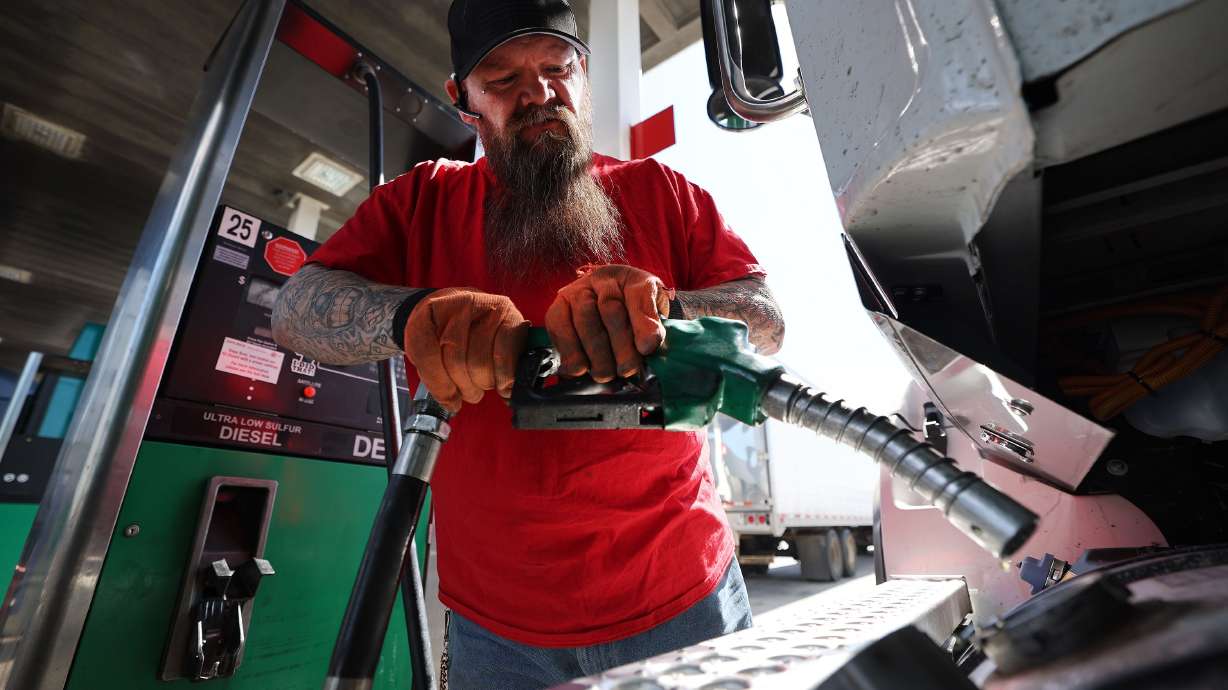Estimated read time: 4-5 minutes
This archived news story is available only for your personal, non-commercial use. Information in the story may be outdated or superseded by additional information. Reading or replaying the story in its archived form does not constitute a republication of the story.
SALT LAKE CITY — An international 10-point plan asserts if its recommendations were put in place, global consumption of crude oil would drop by 2.7 million barrels a day in four months' time.
The recommendations by the International Energy Agency, of which the United States is a member, would require significant overhaul of laws, policy changes and behavioral shifts and are directed at "advanced economies," which make up 45% of the global demand for crude.
Such a reduction could ease the pain at the pump, it said.
"The oil industry's stocks typically help balance the market when demand outweighs supply. But even before Russia's invasion, the industry's oil inventories were depleting rapidly. At the end of January, inventories in advanced economies were 335 million barrels below their five-year average and at eight-year lows," the agency noted.
First, it calls for reduction of speed limits on highways by at least 6 miles per hour or more.
"Reduction in speed limits can be implemented by national governments; many countries did so during the 1973 oil crisis, including the United States and several European countries. Today, many countries use temporary speed limit reductions on highways, mostly to reduce congestion and/or air pollution and to improve road safety," it said.
The National Maximum Speed Limit was put into effect in 1974 in response to the OPEC oil embargo and remained in effect for 21 years in the United States.
The plan also calls for working from home at least three days a week if at all possible.
"In the United States, the average one-way commute by car is around (11 miles) and over three quarters of car commuters travel alone, according to the U.S. Census Bureau," the report said.
Switzerland, the Netherlands and West Germany instituted car-free Sundays during the 1973 oil crisis, according to IEA, and Brussels, Edinburgh and Vancouver have used them more recently to promote public health, community-oriented spaces and cultural events.
"Banning the use of private cars on Sundays brings a number of additional benefits to public health and well-being, including cleaner air, reduced noise pollution and improved road safety," the report said. "In warmer climates, reduced traffic can also reduce urban 'heat-island' effects. The measure is also relatively straightforward to enforce using spot fines and road closures."

The report also calls for making public transit cheaper and instituting incentives to improve bike and walking trails.
Alternating vehicle access in large cities based on license plates has been deployed over the last several decades in many cities to tackle both congestion and air pollution, including Athens, Madrid, Paris, Milan and Mexico City.
Such a solution hinging on even or odd numbered plates might present obstacles if transit is not readily accessible or walking or biking trails are not fully developed, IEA conceded. It might also adversely impact issues of fairness and logistics in lower-income households if one considers wealthier families often have more personal cars at their disposal.
The fairness and practicality issues are what concerns Thom Carter, director of the Utah Office of Energy Development and the energy advisor to Gov. Spencer Cox.
"These are interesting academic exercises, but they leave a big segment of the population behind," he said. "We saw that during COVID that there is a certain segment of the population that can't work from home, and not everyone can take public transit."
He pointed to examples such as those employees in the service industry or those in the agricultural sector for which working from home or public transportation are often not an option.
Additionally, not every city is "walkable" and public transportation is not always readily accessible in states like Utah and others that have rural areas, Carter said.
The report also called for:
- Increased carpooling or car sharing
- Increasing efficiency in freight trucking operations, particularly those that use diesel
- Using high speed or night trains where possible
- Reinforcing the adoption of electric vehicles
Lessons from the global pandemic taught business leaders that virtual meetings can be effective, and airline travel is not always necessary. IEA said flights for business travel should be restricted as much as possible.
"Many companies have invested heavily in enhancing the experience of remote meetings, making this a more effective, acceptable and viable substitute to business flights and direct human engagement. Businesses continued operations — and in some cases thrived — despite having to make this major adjustment," EIA said.
"Several major corporations — such as HSBC, Zurich Insurance, Bain & Company and S&P Global — have already announced targets to cut their business travel emissions by as much as 70%."









